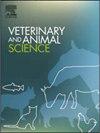芽孢杆菌益生菌对印度肉牛采食量及饲料和饲粮消化率的影响
IF 1.9
Q2 AGRICULTURE, DAIRY & ANIMAL SCIENCE
引用次数: 0
摘要
离子载体通常用于饲养场的饲料中,以提高饲料效率和降低酸中毒风险,特别是在从饲料到富含谷物的饲料的过渡期间。随着对非治疗性抗生素使用的日益关注,益生菌作为潜在替代品的兴趣也在增长。本研究评价了一种芽孢杆菌益生菌对印度肉牛采食量和全肠道营养物质消化率的影响。试验两种饲粮:高纤维饲料饲粮(罗德草干草,690 g/kg中性洗涤纤维(NDF))和饲养场饲粮(20%罗德草干草,40%育肥颗粒,30%花生壳纤维颗粒,10%大麦,470 g/kg NDF)。12头肉牛(267±7.5 kg)按体重分组,随机分为对照组(n = 6)和益生菌补充组(n = 6),每头肉牛接种3 g地衣芽孢杆菌809和枯草芽孢杆菌810 (3.2 × 109 CFU/g)。每种饲粮饲喂34 d,然后进行7 d的粪便和尿液取样。添加益生菌可使有机物质消化率提高7.8%,NDF消化率提高8.4%,显著提高(P <;饲料日粮中可消化纤维采食量的差异(0.05)。饲粮对采食量和消化率均无影响。补充益生菌不影响氮代谢。在摄入不变的情况下,纤维消化率的提高表明,芽孢杆菌益生菌可以提高以饲料为基础的饲料的营养利用率,从而有可能提高高纤维饲料的生产性能。本文章由计算机程序翻译,如有差异,请以英文原文为准。
The effect of a Bacillus-based probiotic on feed intake and digestibility of a forage and a feedlot diet in Bos indicus steers
Ionophores are commonly used in feedlot rations to improve feed efficiency and reduce acidosis risk, particularly during the transition from forage to cereal-rich diets. With increasing concerns over non-therapeutic antibiotic use, interest in probiotics as potential alternative has grown. This study evaluated the effect of a Bacillus-based probiotic on feed intake and total tract nutrient digestibility in Bos indicus steers. Two diets were tested: a high-fibre forage diet (Rhodes grass hay, 690 g/kg neutral detergent fibre (NDF)) and a feedlot diet (20 % Rhodes grass hay, 40 % finisher pellet, 30 % peanut hull fibre pellet, 10 % ground barley, 470 g/kg NDF). Twelve steers (267 ± 7.5 kg) were blocked by body weight and randomly assigned to a control (n = 6) or a probiotic-supplemented group (n = 6) receiving 3 g per steer of Bacillus licheniformis 809 and Bacillus subtilis 810 (3.2 × 109 CFU/g) for the trial duration. Each diet was fed for 34 days, followed by a 7-day sampling period for total faecal and urine collection. Probiotic supplementation increased organic matter digestibility by 7.8 % and NDF digestibility by 8.4 %, resulting in a significant increase (P < 0.05) in digestible fibre intake on the forage diet. No effects on intake or digestibility were observed on the feedlot diet. Probiotic supplementation did not affect nitrogen metabolism. While intake was unchanged, improved fibre digestibility suggests Bacillus-based probiotics can enhance nutrient utilisation in forage-based diets, potentially improving performance in high-fibre diets.
求助全文
通过发布文献求助,成功后即可免费获取论文全文。
去求助
来源期刊

Veterinary and Animal Science
Veterinary-Veterinary (all)
CiteScore
3.50
自引率
0.00%
发文量
43
审稿时长
47 days
 求助内容:
求助内容: 应助结果提醒方式:
应助结果提醒方式:


